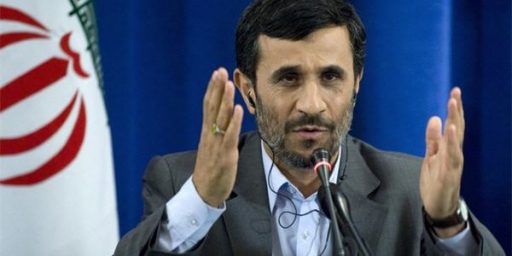Nukes for Al Qaeda
Fareed Zakaria argues that we’re not doing enough to prevent terrorist groups from getting nuclear weapons.
President George W. Bush has often said that the greatest danger we face is that “the world’s most dangerous people” will get their hands on “the world’s most dangerous weapons.” He’s right. Osama bin Laden has called it a “duty” for Al Qaeda to acquire a nuclear bomb. But the truth is that our policies to prevent nuclear terror have not changed much since 9/11.
This is particularly surprising when you consider that the problem of nuclear terrorism is actually solvable. Making a nuclear bomb requires fissile materials—weapons-grade plutonium or uranium. To produce either, you need reprocessors, reactors and enrichment facilities. These are out of the reach of even a large, well-funded terrorist organization. Terrorists can get such materials only by buying them from states. So, if all fissile material around the world were locked up and monitored and no new material were made, it would eliminate the worldwide threat of nuclear terrorism.
Obviously it’s easier said than done, but it can be done. We lack not the means but a clear goal and the determination to get to it. In a recent speech John Kerry proposed setting out this objective, comparing it to putting a man on the moon. Actually it would take less time and would certainly be much less expensive.
For America, the additional cost of such an effort would run about $1 billion a year. We spend $10 billion every year on a national missile defense that doesn’t work. When it does eventually work, it will guard us (sort of) against the least likely means of delivering a nuclear bomb—a missile. Why not spend 10 percent of that to thwart the most likely method of delivery—a suitcase bomb?
He sets out an interesting program for achieveing this objective. Really, though, it’s little different from the current policy in that it has the same fatal flaw: it require absolute cooperation by all parties one hundred percent of the time to have any chance of working.
As with the problem of illegal narcotics, there are powerful incentives to break the embargo. The demand is huge. Many of the states and terrorist groups that have the strongest desire to acquire nuclear capability are well funded, whereas many of the states being asked to guard their existing nuclear materials are poor. Many of the workers who are doing the guarding are poorer still. Presumably, too, some of the guards–as well as states currently possessing nuclear material–are also sympathetic to the states and non-state actors trying to do the acquiring.
None of this is to say that we shouldn’t try. Increasing the barrier to illicit conduct is usually a good thing. But we should recognize that failure is virtually assured in the course of time.





